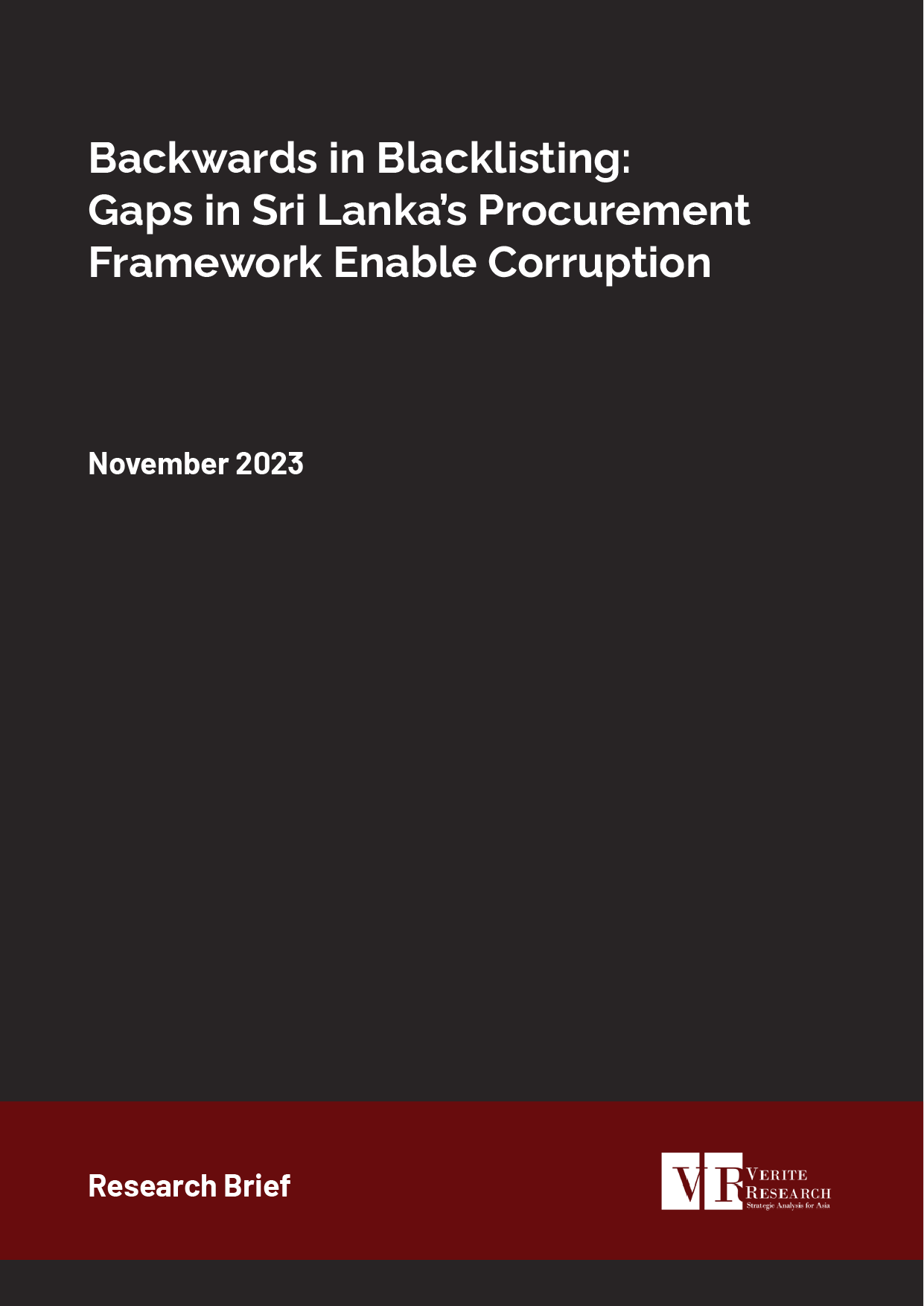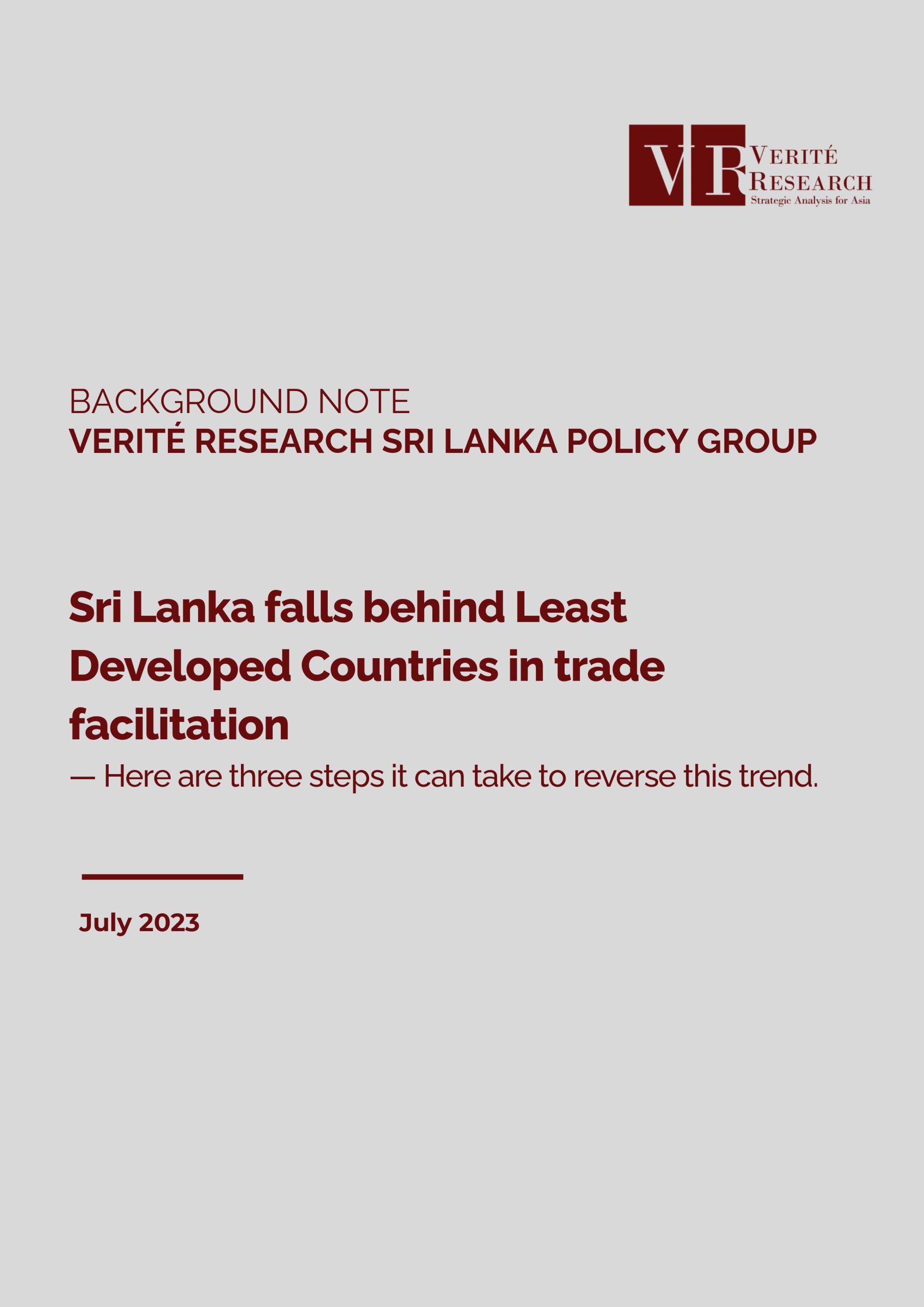The research brief titled “Backwards in Blacklisting: Gaps in Sri Lanka’s Procurement Framework Enable Corruption” by Verité Research, published in November 2023, critically evaluates Sri Lanka’s public procurement system. It highlights two significant gaps: the legal gap, where procurement guidelines don’t allow for blacklisting contractors/suppliers involved in fraud and corruption, and the compliance gap, shown by the failure to maintain a blacklist for defaulting contractors. The brief compares Sri Lanka’s approach unfavourably with other South Asian countries, noting these countries’ more effective implementation of blacklisting and their maintenance of updated online databases of blacklisted firms. The study emphasizes the need for Sri Lanka to implement robust blacklisting provisions and maintain a comprehensive online list of blacklisted companies to deter corruption and ensure efficient use of public funds.
While there may be numerous factors contributing to Sri Lanka’s sluggish export performance, this background note highlights an important one that puts Sri Lankan exporters at a disadvantage: the failure of the government to facilitate trade by making import and export procedures efficient, less costly, more predictable, and transparent. The comparison is done by using the notifications on progress made by countries under the World Trade Organisation’s Trade Facilitation Agreement (TFA) as a yardstick. The analysis finds that Sri Lanka’s progress falls below not only its competitors and peers but also the least developed countries. Out of the 125 developing and least developed countries, Sri Lanka (ranked 104th) is among the countries that have made the least progress in implementing measures to facilitate trade. Based on the findings, this note provides three lessons Sri Lanka can learn from the experience of others and provides an indicative list of ten measures Sri Lanka can prioritise to implement.
Concerns about Sri Lanka losing GSP+ concessions resurfaced with the EU parliament passing a resolution on June 10th, 2021, calling the EU Commission and the European External Action Service (EEAS) to use GSP+ as leverage to push for the repeal or replacement of the Prevention of Terrorism Act (PTA). For Sri Lanka, a major area of concern is the impact of the above on apparel exports to the EU, a key beneficiary of the concessions. Apparel contributes the most to Sri Lanka’s export revenue, accounting for 40-45% of the country’s total exports and the EU is the second largest market for Sri Lankan apparel after the USA, making up 42% of Sri Lanka’s total apparel exports between 2015-2019.
The published information on debt underestimates Sri Lanka’s overall external public debt burden and its distribution amongst external lenders. This problem arises because Sri Lanka’s reporting of external debt is limited to debt held directly by the central government and excludes debt held by state-owned enterprises (SOEs). This reporting problem is especially evident when estimating Sri Lanka’s overall debt obligations to China, since much of Sri Lanka’s debt from China is placed on the books of Sri Lanka’s SOEs. It also exposes a loophole by which debt statistics can be manipulated, and even miscounted, in the midst of such manipulations.
මෙම සංෂිප්ත සටහනෙන් පෙන්වා දෙන්නේ ණය වාර්තාකරණයේදී මධ්යම රජයේ ආයතන වලින් පරිබාහිරව ඇති රාජ්ය ආයතනවල විදේශ ණය ඊට ඇතුලත් කිරීමට අපොහොසත් වීම ලංකාවේ ණය බර අවතක්සේරුවට හේතු වන බවයි. මෙයට හේතුපාදක වන එම තොරතුරුමය ගැටළුව කොටස් තුනක් ඔස්සේ මෙහිදී පැහැදිලි කර ඇත.
Successful economies have increasingly recognised the importance of improving access to data collected by governments. Accurate, timely and easily accessible data helps private sector growth and results in improved delivery by government. Sri Lanka Customs is the key government agency that collects trade data. Access to timely trade data is vital for firms engaging in international trade to make sound business decisions. It is also the basis on which countries should be formulating their trade policies and assessing their impact.
Sri Lanka is highly dependent on international loans from multilateral and bilateral sources to finance infrastructure development. Multilateral and bilateral borrowing is often favoured by governments such as Sri Lanka because such financing tends to have ‘concessional’ elements, relative to the international financial markets. However, this report finds that the practice of ‘tying’ loans to procurement from contractors in the lending country and resulting cost escalations can significantly erode the concessional or grant element of these loans.
Sri Lanka is highly dependent on international loans from multilateral and bilateral sources to finance infrastructure development. Multilateral and bilateral borrowing is often favoured by governments such as Sri Lanka because such financing tends to have ‘concessional’ elements, relative to the international financial markets. However, this report finds that the practice of ‘tying’ loans to procurement from contractors in the lending country and resulting cost escalations can significantly erode the concessional or grant element of these loans.
International trade data are the foundational basis when formulating trade policies and assessing their impacts. Trade data is vital for firms engaging in international trade to make sound business decisions. Unfortunately, when compared to regional and international best practice, Sri Lanka is failing to use trade data effectively for the benefit of the country.
කෝවිඞ් -19 වෛරසය පැතිරීම අවම කිරීම සඳහා ගෙන ඇති ක්රියාමාර්ග හේතුවෙන් ශ්රී ලංකා රජය අයවැය හා ආදායම් අර්බුදයකට මුහුණ දී තිබේ. මෙම අර්බුදයේ බොහෝ අවාසි පැවතුනත්, මෙම තත්ත්වය, ඇතැම් පාර්ශවකරුවන්ගේ අභිලාෂයන් අනුව කටයුතු කිරීමෙන් ඈත් වී, දුම්වැටි බදු ක්රියාත්මක කරන ආකාරය ක්රමවත් කිරීමට රජයට හොඳ අවස්ථාවක් ලෙස භාවිත කල හැකිය. මෙම විශ්ලේෂණය පෙන්වා දෙන්නේ ලංකාවේ දුම්වැටි බදු සහ මිල ගණන් ඉහල දැමීම, රාජ්ය මුල්ය කළමනාකරණ මුල ධර්ම වලට අනුකුලව සිදු වී නොමැති බවයි. රට රාජ්ය මුල්ය අර්බුදයකට මුහුණ දී තිබෙන අවස්තාවක උදාවන, මැයි 31 වන දිනට යෙදී තිබුන ලෝක දුම්කොළ විරෝධී දිනය අපට සිහිපත්කර දෙන්නේ දුම්වැටි බදු ක්රමානුකුලව ඉහල දැමීමට අසමත් වීම ශ්රී ලංකාවේ ආර්ථික ප්රතිපත්තියේ බරපතල අසාර්ථකත්වයක් බවයි.






